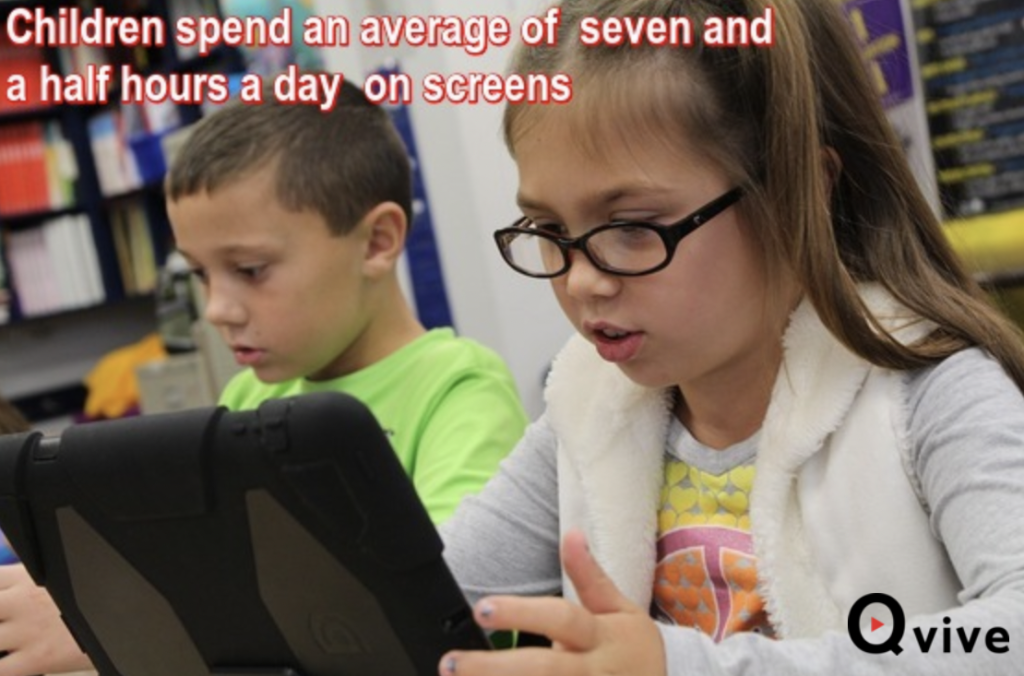Sweden’s Revolutionary Step Towards Digital Detox for Children
Sweden has recently shifted its educational policy to reduce the reliance on digital screens in schools, particularly for younger students, and to re-emphasize traditional learning methods like physical textbooks and handwriting. This move is a response to concerns that excessive screen time may hinder fundamental learning skills and contribute to a decline in academic performance.

Sophie Winkleman’s Speech on Screen Time and EdTech
Sophie Winkleman is an actress who also helps out with many charities like CURE International, the Children’s Surgery Foundation, and School-Home Support. She is part of the board for a group of academy schools in the UK and campaigns against screens for children.

Sophie Winkleman recently addressed important concerns surrounding the use of screen technology—especially within education—at the Alliance For Responsible Citizenship (ARC )Forum 2025. She highlighted that while modern learning often relies on digital tools known as educational technology (EdTech), numerous studies suggest that excessive screen time is detrimental to children’s attention spans, literacy, handwriting, and reading skills.
Key Concerns About Screen Time in Education
- Negative Effects on Learning: Research from the OECD indicates that students who frequently use screens in school actually perform worse academically. This finding challenges the belief that technology inherently enhances learning.
- Sweden’s Approach: Notably, Sweden has made a significant shift by removing tech from classrooms and prioritizing traditional learning methods involving books and pens. This change highlights a growing acknowledgment that EdTech may not be serving the best interests of children.
- Bill Gates has admitted that the performance of classroom devices has been poor, underscoring widespread skepticism about the effectiveness of EdTech.
Sophie pointed out that Mark Zuckerberg went to a tech-free school in Boston, and Steve Jobs didn’t let his own children use iPads.
The Broader Problem of Screen Addiction
Winkleman raises an alarming reality: children spend an average of seven and a half hours a day on screens, against health guidelines suggesting just one to two hours of screen time. This heavy usage is linked to:
- Mental Health Issues: There has been a dramatic increase in mental health problems among teens, with rates of suicide and self-harm rising alarmingly. Social media and excessive screen exposure are significant factors in this crisis.
- Impaired Development: Children today are reporting decreased cognitive skills, emotional regulation, and overall well-being. Traditional childhood activities—like playing outside or reading—are being replaced by screen engagement, which Winkleman argues is creating a generation less able to think independently or engage socially.
A Call for Change
Winkleman urges a reevaluation of current educational practices. She emphasizes that:
- Teachers Should be Prioritized: Instead of investing in EdTech, resources should focus on recruiting and training teachers. Effective teaching has proven benefits for student learning that screens cannot replicate.
- Human Interaction Matters: Studies suggest students learn better when interacting with teachers rather than screens. The need for personal connections in the educational experience is crucial for fostering a deeper understanding of subjects and promoting a love of learning.
- Balanced Use of Technology: While some technology can be helpful, it should enhance rather than dominate the educational space. Implementing technology thoughtfully and sparingly can yield positive results without overshadowing traditional learning methods.
Winkleman concludes that we need to reassess the rush into widespread digital learning. She advocates for a culture that cherishes books, pencils, and human interaction, suggesting that true educational improvement lies in protecting childhood rather than conforming to a screen-centered existence. To secure a healthy future for children, we must prioritize their well-being and development over the allure of digital convenience and hype.
The concern extends beyond learning; it touches on privacy and the integrity of childhood itself. By establishing clear boundaries around screen use in educational settings, we can work to return joy and fulfillment to children’s lives through genuine learning experiences.
The disadvantages of having screens in schools, as highlighted by Sweden’s policy shift and expert opinions, include:
Potential for Hindered Foundational Skill Development
One of the primary concerns is that excessive use of digital tools can impede the development of foundational literacy and numeracy skills, especially in early education. Traditional methods, such as handwriting and reading physical books, are considered crucial for building a strong knowledge base before introducing more advanced digital tools. The Karolinska Institute, a respected medical school in Sweden, stated that there is “clear scientific evidence that digital tools impair rather than enhance student learning”. This is particularly relevant for younger children who need hands-on, focused learning without the distractions screens can present.
Decline in Academic Performance
Sweden’s decision was partly spurred by a decline in student performance, particularly in reading comprehension. The Progress in International Reading Literacy Study (PIRLS) showed a drop in reading levels among Swedish fourth-graders between 2016 and 2021. While other factors like the COVID-19 pandemic and an increase in immigrant students were considered, education experts suggest that an overuse of screens during school lessons might cause youngsters to fall behind in core subjects. The OECD’s PISA test also indicated increasingly worse results for Sweden and its Nordic neighbors since 2013, after they were once considered a benchmark in education.
Distraction and Reduced Focus
Screens can introduce significant distractions in the classroom, making it harder for students to concentrate on learning. The constant availability of online content and notifications can pull students away from the lesson, impacting their ability to engage deeply with the material.
Negative Health Impacts
Excessive screen time has been linked to several negative health outcomes for children and teenagers. Sweden’s public health agency has issued recommendations to limit screen time, citing research that found negative effects such as poorer sleep, depression, and limited physical activity with high use of digital devices. The agency also noted a “sleep crisis” among Swedish teenagers, with many not getting enough sleep due to extended screen use.
Lack of Pedagogical Effectiveness and Misuse
Experts question the actual pedagogical benefits of widespread digital tool adoption without careful consideration. Some argue that there is no straightforward evidence that technology consistently improves learning outcomes. The effectiveness of digital tools depends heavily on how they are used, and simply introducing them does not guarantee improved education. There’s a concern that technology is sometimes integrated without proper assessment of its effectiveness, leading to its indiscriminate use rather than intentional application to enhance learning. Furthermore, some experts suggest that “freedom of learning” through technological means is only useful for students who already have a strong knowledge base, and not for those at the most basic levels, where traditional methods are still necessary.
Digital Divide and Inequality
While not a direct disadvantage of screens themselves, the reliance on digital tools can exacerbate the digital divide. In areas with limited connectivity at home, students may not have equal access to educational resources, potentially increasing inequalities. This highlights the importance of ensuring a basic level of literacy and mathematics through traditional means to create equal opportunities in the digital environment.
Concerns about Data Privacy and Misinformation
A UNESCO report noted insufficient regulations around unauthorized use of personal data for commercial purposes and the spread of misinformation and hate speech online as potential drawbacks of digital technology in education. These challenges can “cancel out any benefits” of digital learning.
Impact on Socialization and Real-Life Learning
The UNESCO report also suggests that while digital technology can augment education, it can come at a cost to socialization and real-life learning. Over-reliance on screens may reduce opportunities for in-person interaction and hands-on experiences that are crucial for holistic development.
Sweden’s approach is not a complete ban but a recalibration, aiming for a balanced hybrid model where digital tools are used consciously and effectively to complement traditional methods, rather than replacing them indiscriminately.
Ref:
- Sweden’s Shift in Education & Tech Use In Classrooms: It’s Not A Complete Ban As Some Are Reporting. [ https://www.thewhitehatter.ca/post/swedens-shift-in-education-tech-use-in-classrooms-its-not-a-complete-ban-as-some-are-reporting ]
- Sweden says back-to-basics schooling works on paper. [ https://www.theguardian.com/world/2023/sep/11/sweden-says-back-to-basics-schooling-works-on-paper ]
- Tech-Savvy Sweden Leads Global Push To Ban Screens In Classrooms. [ https://ethic.es/english/tech-savvy-sweden-leads-global-push-to-ban-screens-in-classrooms/ ]
- The Hybrid Classroom Approach. [ https://aisearchinc.com/knowledge/hybrid-classroom-approach ]
- Sweden joins countries seeking to end screen time for children under 2. [ https://halifax.citynews.ca/2024/09/06/sweden-joins-countries-seeking-to-end-screen-time-for-children-under-2/ ]
- Toddlers should not be allowed to watch screens at all, Sweden told parents on Monday, September 2. [ https://www.lemonde.fr/en/parentology/article/2024/09/02/sweden-recommends-no-screens-for-toddlers_6724475_77.html ]
Also Read:
